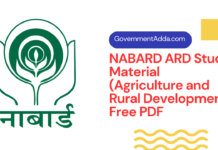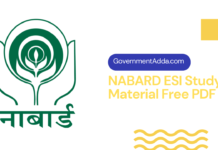Complete NABARD Exam Pattern for Prelims & Mains
Exam Pattern for NABARD 2019 : NABARD Exam Pattern for Phase 1 & 2, Latest Exam Pattern for NABARD Exam (Stage 1 & 2), NABARD Complete Exam Pattern for Prelims & Mains, NABARD Detailed Exam Pattern , NABARD Phase 1 & Phase 2 Full Exam Pattern. “NABARD Study Material Books PDF“
So the candidates who are going to attend the Exam can look at the NABARD Exam Pattern here. Hope these Details will help you at the time of your Exam Preparation. Hence check complete syllabus & Exam Pattern for NABARD and start your Exam Preparation as early as possible.
For NABARD Preparation Join Our Telegram Group Now >> Click Here
For Best Handwritten Notes for All Subjects & Trades Join Our Telegram Channel >> Click Here
NABARD Grade A Recruitment 2019 will be conducted in three phases as follows:
- Preliminary Exam
- Mains Exam
- Interview
| Phase I – Preliminary Examination (Online Exam) |
| Objective Type: MCQ (Multiple Choice Questions) carrying 200 marks.
Duration: 120 Minutes Composite Time i) Test of Reasoning – – 20 questions – 20 marks ii) English Language – – 40 questions – 40 marks iii) Computer Knowledge – 20 questions – 20 marks iv) General Awareness – 20 questions – 20 marks v) Quantitative Aptitude – 20 questions – 20 marks vi) Economic & Social Issues (with focus on Rural India) – 40 questions – 40 marks vii) Agriculture & Rural Development (with focus on Rural India) – 40 questions- 40 marks Total Marks : 200 |
| Phase II – Main Examination will be online and will be a mix of MCQ and descriptive pattern. |
| Paper-I – General English: (Descriptive – online through key board)
The paper will have descriptive questions carrying 100 marks. Duration: 1 ½ hrs The analytical and drafting abilities of the candidate shall be assessed through the Descriptive Paper on General English comprising essay writing, comprehension, report writing, paragraph writing & letter writing. Essay (40 Marks), Precis (20 Marks), Questions on the Precis para (20 Marks), Report / Letter Writing (20 Marks). |
| Paper–II (MCQ): i) for posts as at (i) in Table I – Economic & Social Issues and Agriculture & Rural Development (with focus on rural India)
ii) for posts as at (ii) to (x) in Table I : Paper on related discipline Duration: 1 ½ hrs. – 100 Marks |
| Phase III – Interview |
| Applicants qualifying in the Phase-II Examination and securing sufficiently high rank in merit shall be short-listed for interview.
Marks for Interview : 25 Marks |
* The Preliminary Examination is only qualifying in nature and is meant to serve as a screening test. Only those candidates who score sufficiently high in both, individual tests & in aggregate, shall be shortlisted for Main Examination in the calling ratio of maximum 1:25 based on the cut off arrived on performance of the candidates in the examination. Similarly, only such candidates who score the cut off marks or above in the Main Examination will be shortlisted for interview. The calling ratio for Interview shall be a maximum of 1:5. There will be penalty for wrong answers marked by the candidate. For every wrong answer marked, 1/4th of the marks assigned to that question will be deducted as penalty in Phase I and Phase II, both. Cut-offs in Phase I and Phase II may be applied in two stages: (i) On scores in individual tests,
On Total Score.
Since the vacancies are earmarked discipline-wise, merit list of candidates for each stage will be prepared discipline-wise.
- The final selection of the applicants for the post of Assistant Manager in Grade ‘A’ (RDBS) will be based on their performance in the Phase-II Main Examination and Interview, taken In case of candidates securing same marks their ranking will be decided as under:
- Among the candidates having equal marks in total (Main examination + interview taken together), the candidate with higher marks in Main Examination will be ranked
- In case of having equal marks in Main Examination also, candidate with higher qualification or in case of similar qualification, candidate with higher marks in graduation will be ranked In case of further tie-up, the candidate senior in age will be ranked higher.
For shortlisting from Prelims to Mains and Mains to Interview, all candidates with tied marks will be shortlisted.
NOTE: With a view to overcoming the possibility of applicants seeking help of other applicants during the online / main exam, the Bank would be analysing the responses of applicants in the main examination with other appeared applicants to detect patterns of similarity of right and wrong answers. On the basis of such an analysis, if it is suspected that the responses have been shared and scores obtained are not genuine/ valid, the Bank reserves the right to cancel the candidature of the suspected applicants. Hence the applicants are advised in their own interest not to indulge in any unfair practice in the exams.
NABARD Grade A & B 2019 Complete Question Paper,Study Material, Books, Cutoff Marks, Notification, Study Plan
| NABARD Grade A & B Assistant Manager 2019 Important Links | ||
| 1. | NABARD Assistant Manager Grade A & B 2019 Recruitment Notification Apply Online | Click Here |
| 2. | NABARD Grade A & B Officers Exam Syllabus 2019 – Prelims/Mains | Click Here |
| 3. | NABARD Grade A & B Officers Exam Pattern 2019 – Prelims/Mains | Click Here |
| 4. | NABARD Grade A & B Assistant Manager Previous Year Question Papers PDF – Download Here | Click Here |
| 5. | NABARD Grade A & B Previous Year Cut Off Marks | 2017, 2016, 2015 Cut Off Marks | Click Here |
| 6. | NABARD Grade A & B Assistant Manager Study Material | Books | ESI | ARD | English | GK Pdfs | Click Here |
| 7. | NABARD Grade A & B Assistant Manager ARD Agriculture and Rural Development PDF | Notes | Books | Click Here |
| 8. | NABARD Grade A & B Assistant Manager ESI Economics & Social Issues PDF | Notes | Books | Click Here |
| 9. | NABARD Grade A & B Assistant Manager Study Plan | How To Prepare For NABARD Grade A & B Officer Exam | Click Here |
| 10. | NABARD ARD StudyPlan & Preparation Tips and Tricks for Agriculture and Rural Development (ARD) | Click Here |
| 11. | NABARD ESI Study Plan & Preparation Tips and Tricks for Economic & Social Issues(ESI) | Click Here |















